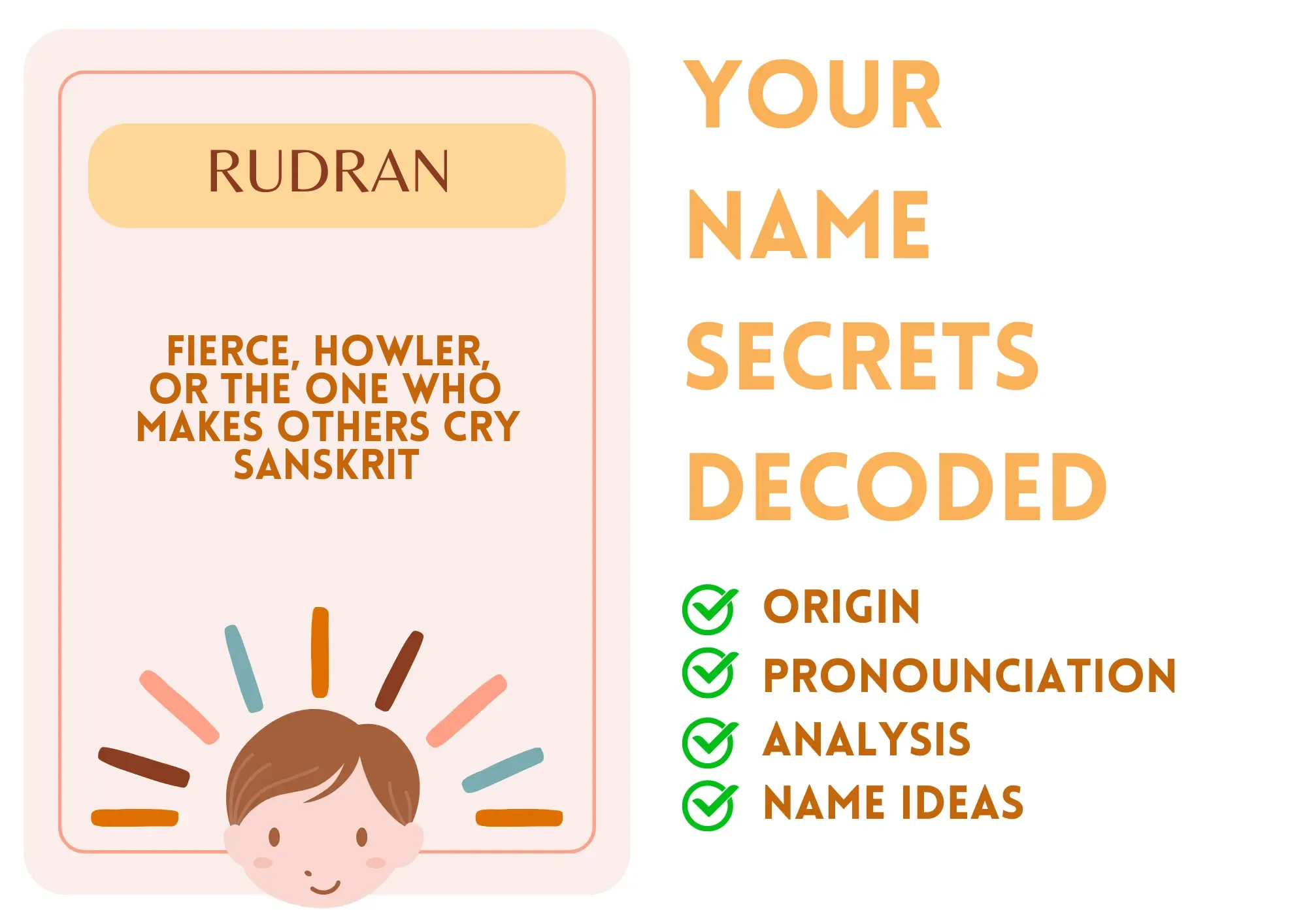
Rudran
Rudran is a name of profound significance, deriving from the Sanskrit language, predominantly used in India. It translates to 'the fierce', 'the howler', or 'one who makes others cry' associated specifically with Lord Shiva, the god of destruction and regeneration in Hindu tradition. This title symbolizes the transformational aspects of life and the cosmos.
The name holds deep cultural significance in Hinduism, representing the strength and complexity of Hindu philosophy. Its historical roots extend back to ancient scriptures that evoke reverence towards Lord Shiva as Rudra, the storm god.
Rudran is perceived positively, echoing strength and divine qualities. It is relatively easy to write and pronounce, with common nicknames including Rudy or Rudi. The name has inspired various interpretations in modern literature and media, often linked to themes of transformation and power.
Basic Information
Gender: Boy
Sounds Like: ROOD-ruhn
Pronunciation Explanation: The first syllable is pronounced with a long 'oo' sound like in 'food', and the second syllable has a softer 'ruhn' sound.
Summary and Meaning
Meaning: fierce, howler, or the one who makes others cry (Sanskrit)
Origin: Rudran has Indian origins, deeply rooted in Hindu culture and Sanskrit language.
Usage: Rudran is traditionally a masculine name commonly assigned to boys.
Name Number (Chaldean)
Name Number (Pythagorean)
Name Constellation (Nakshatra)
Name Zodiac Sign (Rashi)
Popularity (Global Rank)
Overall: 198074
Boys: 54235
Most Popular in
Religious and Cultural Significance
Religion: Hindu
Background: In Hindu culture, Rudran is significantly linked with Lord Shiva, representing destruction and regeneration, and emphasizes the duality of creation and destruction.
Cultural Significance: Rudran is often chosen by parents hoping to instill strength and transformational qualities in their children, reflecting a desire for them to embody resilience.
Historical Significance: Historically, Rudra is a prominent deity in ancient Vedic texts, symbolizing a powerful aspect of nature, often invoked in rituals for protection and healing, representing the forces of change.
Popular Culture
Literature and Mythology: Rudran does occasionally appear in contemporary retellings of Hindu epics and poetic works that evoke elements of spirituality and transformation.
Movies and Television: Characters named Rudran or variations thereof appear in Indian cinema as embodiments of strength, resilience, and dynamic change, often linked to tales of heroism.
Feelings and Perceptions
Perception: Rudran is largely perceived positively, associated with power, strength, and spirituality, though it may seem unique or unfamiliar to those outside Indian culture.
Positive Feelings: Powerful, spiritual, resilient, unique, deep-rooted in culture.
Negative Feelings: May be considered hard to pronounce or unfamiliar to some non-Hindi speakers.
Practical Considerations
Ease of Writing and Calling: Rudran is relatively straightforward to write and pronounce, composed of six letters and two syllables that flow well together, making it memorable.
Common Typos and Misspellings: Rudranh,Rudraan,Rudrhan,Rudran
Common Nicknames: Rudy,Rudi
Rudran Popularity
Rudran Usage and Popularity By Country
| Country | Rank (Overall) |
|---|---|
| Sri Lanka | 8013 |
| Bahrain | 9628 |
| Qatar | 21780 |
| Australia | 42971 |
| Singapore | 53638 |
| Malaysia | 55545 |
| Spain | 63520 |
| India | 68271 |
| United Kingdom | 90588 |
Rudran Usage and Popularity By City
| City | Rank (Overall) |
|---|---|
| Chennai | 25193 |
Compatibility Analysis
Famous Persons Named Rudran
No results found for Rudran.
Related Names
Similar Sounding Names:
Rudra,Rudranath,Rudvik